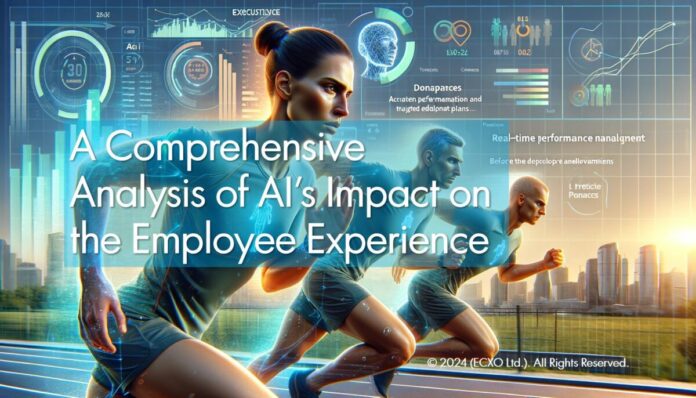By Ricardo Saltz Gulko
This article is published through a partnership with the European CX Organisation (ECXO). Read the original here.
As we have explored, AI is fundamentally transforming the employee experience, touching every aspect from recruitment and onboarding to learning, development, and day-to-day engagement. This transformation, driven by advanced data analytics, machine learning, and predictive technologies, is ushering in a new era of workplace efficiency and personalization. However, the path forward is not without its challenges. To fully harness the potential of AI, organizations must navigate a complex landscape of ethical, privacy, and change management considerations. This comprehensive conclusion examines these facets in greater depth and outlines a strategic approach to leveraging AI for enhanced employee experiences.
The Multi-Dimensional Impact of AI
AI’s impact on the employee experience is multi-faceted, providing significant benefits while also posing substantial challenges. By examining these dimensions closely, we can better understand how to maximize the advantages while mitigating the risks.
Enhancing Recruitment and Onboarding
AI’s role in recruitment and onboarding is transformative. Automated resume screening, AI-powered interviews, and predictive analytics streamline the hiring process, making it faster and more efficient. This not only improves the candidate experience but also ensures that organizations attract the best talent. However, the reliance on AI also necessitates stringent measures to avoid biases and ensure fairness, as AI systems can inadvertently perpetuate existing biases in hiring practices.
Personalized Learning and Development

AI-driven personalized learning paths and continuous feedback mechanisms are revolutionizing employee development. By tailoring learning experiences to individual needs and career aspirations, AI fosters a culture of continuous improvement and skill acquisition. This adaptability is crucial in an era where the pace of technological change demands ongoing learning. Yet, the success of these initiatives depends on the quality of data and the sophistication of AI algorithms. Organizations must invest in robust data infrastructure and continuously refine their AI models to ensure accuracy and relevance.
Employee Engagement and Well-being
AI’s ability to monitor employee sentiment and personalize well-being programs is a game-changer for maintaining high levels of engagement and satisfaction. Sentiment analysis tools that gauge employee morale through various communication channels enable HR to proactively address issues, thereby preventing potential burnout and disengagement. Personalized well-being programs tailored to individual preferences further enhance this engagement. However, organizations must ensure that these AI tools are used ethically, respecting employee privacy and obtaining explicit consent for data usage.
Performance Management

Image source DALL·E
AI enhances performance management by providing real-time insights and predictive analytics, allowing for timely interventions and support. This leads to more accurate performance evaluations and targeted development plans. The predictive capabilities of AI can identify trends and potential issues before they become significant problems, thereby enhancing overall productivity. Nevertheless, the implementation of AI in performance management requires transparency and fairness to ensure that employees trust the system and feel valued.
Collaboration and Communication
AI-powered communication tools facilitate better collaboration, especially in remote and hybrid work environments. Smart assistants and enhanced collaboration platforms streamline workflows and ensure that employees have the necessary information and resources at their fingertips. This not only boosts productivity but also fosters a more cohesive and collaborative work culture. The challenge lies in ensuring that these tools are user-friendly and seamlessly integrated into existing workflows to minimize disruption.
Navigating Challenges and Ethical Considerations
While the benefits of AI are substantial, the challenges and ethical considerations cannot be overlooked. Data privacy, ethical AI use, and effective change management are critical to the successful implementation of AI technologies.
Data Privacy and Security
The increasing use of AI necessitates stringent data privacy and security measures. Organizations must implement robust data governance frameworks to manage data access, usage, and protection. Ensuring transparency and obtaining employee consent for data usage are essential steps in building trust and compliance with regulations.
Ethical AI Use
The ethical use of AI is paramount. Organizations must regularly audit AI systems for biases and take corrective actions as needed. Maintaining clear documentation of AI decision-making processes and establishing mechanisms for accountability are critical to ensuring that AI decisions are fair and transparent.
Change Management
Integrating AI into the workplace requires careful change management. Organizations must provide comprehensive training programs to help employees understand and effectively use AI tools. Open communication about the benefits and challenges of AI adoption is essential to address employee concerns and foster a positive attitude toward technological change.
The Strategic Path Forward
To fully leverage the potential of AI, organizations must adopt a strategic approach that integrates AI responsibly and effectively into their operations. This involves several key steps:
- Invest in Robust Data Infrastructure: Ensure that data used by AI systems is accurate, comprehensive, and up-to-date. Invest in data management technologies and practices that support the effective use of AI.
- Develop Ethical AI Practices: Establish clear guidelines and practices for the ethical use of AI. Regularly audit AI systems for biases and ensure transparency in AI decision-making processes.
- Foster a Culture of Continuous Learning: Encourage a culture of continuous learning and development. Provide employees with access to AI-driven learning tools and resources that support their career growth and development.
- Engage Employees in the AI Journey: Involve employees in the AI adoption process. Communicate the benefits and challenges of AI, address concerns, and provide training and support to help employees adapt to new technologies.
- Monitor and Evaluate AI Impact: Continuously monitor the impact of AI on the employee experience. Use feedback and performance data to refine AI systems and practices, ensuring they continue to meet organizational and employee needs.

